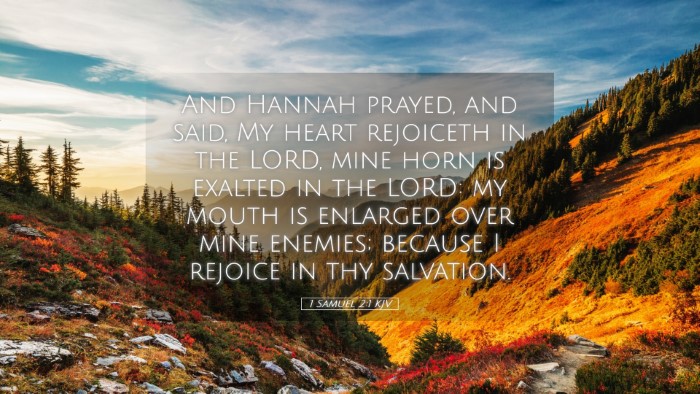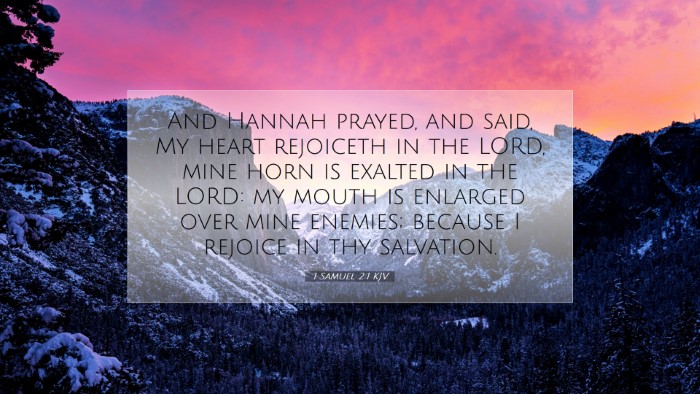Commentary on 1 Samuel 2:1
Verse: "And Hannah prayed, and said, My heart rejoiceth in the LORD, mine horn is exalted in the LORD: my mouth is enlarged over mine enemies; because I rejoice in thy salvation."
Introduction
This verse marks a significant moment in the narrative of Hannah, the mother of Samuel. Her prayer, often referred to as the 'Song of Hannah', encapsulates deep theological themes such as divine intervention, personal praise, and the reversal of fortunes. Hannah's experience mirrors the profound transformations that can arise through faithful prayer and reliance on God.
Exegesis and Theological Insights
-
Context of Hannah's Prayer:
Hannah, once barren and humiliated by Peninnah, her husband's other wife, experiences the miraculous birth of Samuel. This prayer is not merely a song of thanks but serves as a declaration of God’s greatness and a proclamation of His salvation, reflecting her transformed circumstances.
-
Theological Significance:
The phrase "My heart rejoiceth in the LORD" signifies a profound internal joy that comes from a relationship with the Creator. This highlights the theme that true joy is found not in circumstances but in God Himself.
-
"Mine horn is exalted":
The term "horn," a biblical symbol of strength and power, illustrates Hannah’s newfound dignity and honor. In the ancient Near Eastern context, a horn represents not only power but also victory, showing that her status has been elevated by God.
-
Defeat of Enemies:
Hannah's declaration that "my mouth is enlarged over mine enemies" suggests vindication against those who mocked her. This reflects the broader biblical theme of God exalting the humble and bringing low the proud (cf. Luke 1:52).
-
Salvation:
Hannah rejoices in "thy salvation," which speaks to the deliverance she has received. Throughout scripture, this concept of salvation often encompasses physical, spiritual, and communal aspects. Here, it emphasizes God's saving action in Hannah's life.
Comparative Commentary
-
Matthew Henry:
Matthew Henry notes that Hannah's prayer is a model of how to express gratitude and praise to God. He emphasizes that her joy is rooted in the recognition of God’s sovereignty and grace, and that her experience serves to inspire believers to present their needs before God with confidence.
-
Albert Barnes:
Barnes highlights that Hannah’s prayer reflects the heart of true worship, which includes acknowledging God's provisions and celebrating deliverance. He portrays this hymn as prophetic in nature, foreshadowing the exaltation of God’s chosen rulers and the eventual rise of a king (as represented by David).
-
Adam Clarke:
Clarke interprets Hannah's references to her "horn" as an expression of her confidence in God’s promises. He comments on the implications of her being a vessel used by God, through which divine purpose is realized, underscoring the importance of surrender and faith in God’s plan.
Application for Pastors and Theologians
Hannah's prayer serves as a spiritual blueprint for worship. Pastors can draw from her experience to encourage congregants in their times of distress, emphasizing the importance of prayer and patience. The theological implications of her gratitude offer a deep well for exploration in sermons on divine sovereignty and human response.
Conclusion
1 Samuel 2:1 stands as a profound testament to the transformative power of prayer and the faithfulness of God. In Hannah’s words, we find an encouragement to those who feel powerless or overlooked, reminding all believers of the joy that comes through God’s salvation.


